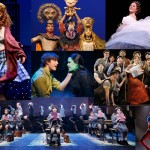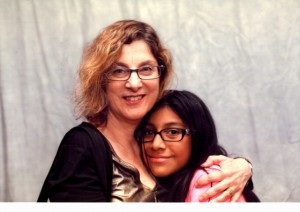 I became a first time parent in middle age. Prior to that, I had a long run immersed in the cultural life of New York City, where I lived, and still live. My cultural palate was diverse and full, and I felt humbled and grateful to be deeply connected to a world so richly filled with art and artists.
I became a first time parent in middle age. Prior to that, I had a long run immersed in the cultural life of New York City, where I lived, and still live. My cultural palate was diverse and full, and I felt humbled and grateful to be deeply connected to a world so richly filled with art and artists.
I had a big social life, and most of my friends were people I’d met at artist colonies, where I often spent time writing. The friends I made were novelists, poets, screenwriters, painters, sculptors, composers, and musicians.
Fast forward to my new life as the first time mother of an infant daughter. I was simply too exhausted to do much socializing or event-hopping. I got by on so little sleep, and had so little free time, I didn’t have it in me to linger over lunch with a poet friend to discuss her latest chapbook.
When I did have time to socialize, I often did it with my daughter in tow, and it tended to be with other new parents, which whom I could discuss the minutia of diaper rash, diaper changing, and the best type of stroller for city streets, rather than the use of metaphor in the latest French avant-garde film. I was far less obsessed with the arts at that point than with my daughter’s “art” of projectile vomiting.
When my daughter grew into toddlerhood, I found portions of my days caught up in the “culture” of her age group. I spent hours with her watching “Barney,” “Sesame Street,” “The Backyardigans,” and “Teletubbies.” The song that often ran through my head was no longer one by my composer friends, but the “I Love You” song from “Barney,” which I couldn’t, for better or worse, get rid of. I discussed passionately the merits of “The Backyardigans” versus “Barney,” about which I felt strongly. (“The Backyardigans” is, in my opinion, a more sophisticated and creative show.) Among the books I read were Good Night Moon and Everyone Poops.
Now that my daughter’s a ‘tween, she and I watch “DeGrassi,” a TV show about a group of teenagers attending the same high school, and their problems concerning school, sex, and family. I feel close to her as we sit side by side on my bed, snuggling as we watch together and discuss whether the kids are ready for sex, and should the transgender boy be allowed to use the boy’s bathroom. These are questions of great concern to her, and I love the fact that she takes time to really think before answering. “No,” she says, “they’re not ready for sex because they don’t know each other well enough yet. And, yes, of course the trans boy should be able to use the boy’s bathroom – he’s a boy, isn’t he?”
Recently, we saw the film, “Mall Cop,” at her request, about a klutzy security guard who everyone makes fun of, but who ultimately is the only one who can thwart a robbery attempt at the mall. I asked her why she thinks people make so much fun of the mall cop. “Because he’s chubby, which is cruel,” she answered, and I agreed with her, proud of her sensitivity. It’s true that “Mall Cop” is a pretty lowbrow and infantile movie – it will never be a cultural icon – but it makes my daughter laugh out loud and that delights me more than attending the latest avant-garde opera these days.
I do try to see my artist friends as much as possible (I’ve lost a few friendships due to my new life and schedule as a parent), and I do attend the occasional art opening and literary reading, and I’m immersing myself once again in “grown-up” literature. But the reality of my life is that my cultural palate has radically changed. Seasoned parents tell me that it will change again when my daughter becomes a full-fledged teenager, when the last thing in the world she will want to do is watch TV or go to the movies with me (or even be seen in public with me).
When that happens, as everyone says is inevitable, I will not watch “Mall Cop” or “Mall Cop 2” without her. I will find my way back to things more grown up and challenging, and I may be able to stay up later at night, so that I can once again take advantage of life in the adult lane. But I am pretty sure that I will miss my forays into Everyone Poops and the way my young daughter’s eyes lit up as she learned that elephants and mice do it, too.
Janice Eidus is a novelist, essayist, and short story writer. Twice winner of the O.Henry Prize and a Pushcart Prize, she’s published the novels, The War of the Rosens, The Last Jewish Virgin, Urban Bliss, and Faithful Rebecca. Her story collections include The Celibacy Club and Vito Loves Geraldine. Her work appears in such magazines as The New York Times and Lilith. She publishes regularly in www.purpleclover.com. She has lived in The Virgin Islands and Mexico, and currently lives in New York City .(www.janiceeidus.com)

